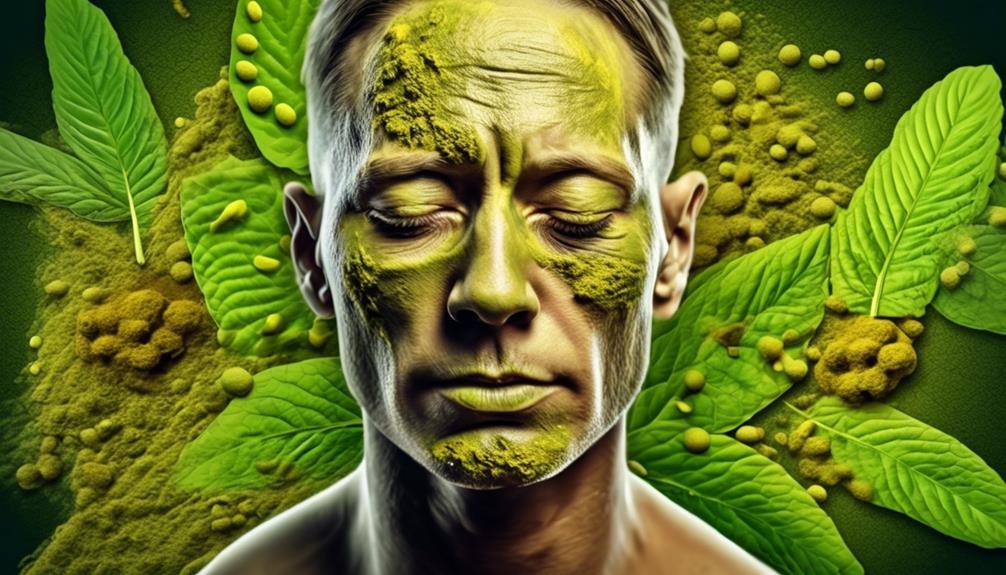Have you ever wondered if there is any truth to the theory that kratom could potentially cause liver damage? Well, you're not alone. Many people are curious about the potential risks associated with this popular herbal supplement. In this discussion, we will explore the research on kratom and its impact on liver health, the symptoms and complications of kratom-induced liver damage, as well as safety measures to consider when using kratom. But that's not all, we will also discuss ways to improve liver health after kratom use. So, let's dive into the world of kratom and its potential effects on the liver.
Kratom's Impact on Liver Health
Kratom's impact on liver health has been a growing concern, as it has been associated with acute liver injury and even rare cases of acute liver failure. This herbal supplement, commonly used as an alternative medicine, has been linked to adverse events such as acute liver injury, organ dysfunction, toxicity, coma, seizures, and even death. In fact, kratom is the second most common cause of drug-induced liver injury in the US, with most cases being cholestatic in nature.
It is crucial for healthcare providers to be aware of the risks posed by kratom, as public awareness of the potential liver damage associated with kratom use is essential. The increasing availability and popularity of this herbal supplement have raised concerns about its safety. Understanding the relationship between kratom and liver injury is of utmost importance to protect public health.
Research has shown that kratom-induced liver injury can occur even with low doses and short-term use. This highlights the need for caution when using kratom or any herbal supplement. More studies are needed to explore the mechanisms behind kratom-induced liver injury and to better understand the risks involved.
Research on Kratom and Liver Damage
Has research established a causal relationship between kratom use and liver damage? While the evidence is not definitive, studies have suggested a potential link between kratom and liver damage. Several case reports have documented instances of liver injury associated with kratom use, indicating a possible adverse effect on liver health.
In these case reports, individuals who consumed kratom experienced symptoms such as jaundice, dark urine, abdominal pain, and elevated liver enzymes. Moreover, some cases progressed to acute liver failure, necessitating liver transplantation. These findings raise concerns about the potential hepatotoxicity of kratom.
Although the exact mechanisms by which kratom may cause liver damage remain unclear, it is important for healthcare providers to be aware of this potential risk. Thorough history-taking, including inquiries about supplement and medication use, is crucial in patients with liver dysfunction or suspected drug-induced liver injury (DILI) related to kratom consumption.
Given the increase in public awareness surrounding kratom's potential adverse effects, further research is needed to better understand the association between kratom use and liver damage. This includes conducting large-scale studies to determine the prevalence and severity of kratom-related liver injury. Additionally, support for regulation of kratom as an herbal supplement is essential to ensure public health and safety.
Symptoms and Complications of Kratom-Induced Liver Damage

Several case reports have highlighted the potential risks of kratom use on liver health, and understanding the symptoms and complications of kratom-induced liver damage is crucial for healthcare providers. Here are the key symptoms and complications associated with kratom-induced liver damage:
- Symptoms:
- Dark urine and pale stool color: These changes in urine and stool color can be indicative of liver dysfunction caused by kratom use.
- Fatigue: Feeling excessively tired or lacking energy is a common symptom of liver damage.
- Nausea and vomiting: These gastrointestinal symptoms can occur due to liver inflammation and dysfunction.
- Jaundice: A yellowing of the skin and eyes is a hallmark sign of liver damage.
- Itchy skin: Pruritus, or itching, can be a result of liver dysfunction.
- Swelling of the legs, ankles, and feet: Edema in the lower extremities can occur when the liver is not functioning properly.
- Complications:
- Acute liver injury: Prolonged and excessive kratom use can lead to acute liver injury, which may manifest as liver failure.
- Severe infections: Liver damage can weaken the immune system, making individuals more susceptible to infections.
- Bleeding: Impaired liver function can disrupt blood clotting mechanisms, leading to increased bleeding tendencies.
- Increased brain pressure: Liver damage can cause a buildup of toxins in the blood, leading to increased pressure in the brain.
- Need for a liver transplant: In severe cases of kratom-induced liver damage, a liver transplant may be necessary to restore liver function.
Understanding these symptoms and complications is vital to increasing healthcare provider and public awareness about the potential risks associated with kratom use. Recognizing the signs of liver damage allows for prompt intervention and appropriate management of adverse events related to this herbal supplement with psychotropic properties.
Safety Measures for Kratom Use
To ensure the safe use of kratom, it is crucial to follow certain measures that can minimize the risk of potential liver damage. Adverse events related to kratom use, including liver injury, have been reported in some case reports. Therefore, it is important to take precautions to protect your liver while using this herbal supplement.
First and foremost, it is highly recommended to consult a healthcare professional before using kratom, especially if you have underlying liver conditions or if you are taking medications that may interact with kratom. Your healthcare provider can provide personalized advice and guidance based on your specific situation.
When starting to use kratom, it is advisable to begin with low doses. This allows you to assess how your body responds to the substance and reduces the risk of experiencing adverse effects, including potential liver injury. Starting low and gradually increasing the dosage, if necessary, can help minimize the potential risks associated with kratom use.
It is crucial to avoid mixing kratom with other substances, such as alcohol or prescription medications, as these combinations may exacerbate the potential liver-damaging effects of kratom. By refraining from mixing kratom with other substances, you can further reduce the likelihood of experiencing liver-related complications.
Regularly monitoring your liver function through blood tests is another important safety measure when using kratom. If you choose to use kratom, it is recommended to have your liver function checked periodically. If any abnormalities are detected, it is essential to discontinue the use of kratom and seek medical attention.
Considering alternative pain management options is also worth exploring, as it can help you avoid the potential risks associated with kratom use. There are non-kratom alternatives available for managing pain and other conditions, providing viable options that do not carry the same potential for liver damage.
Improving Liver Health After Kratom Use

Improving liver health after using kratom can be achieved through various measures. Taking care of your liver is crucial, especially if you have been using this herbal supplement. Here are some steps you can take to support your liver health:
- Stay hydrated: Drinking enough water is essential for overall health, including liver function. Water helps flush out toxins and aids in the body's detoxification processes. Aim to drink at least eight glasses of water per day.
- Follow a healthy diet: Consuming a balanced and nutritious diet is vital for liver health. Include plenty of fruits, vegetables, lean proteins, and whole grains in your meals. These foods provide essential nutrients that support liver function and overall well-being.
- Regular check-ups: It is important to schedule regular check-ups with a healthcare provider to monitor your liver function. They can perform tests to detect any potential issues early on. If you have a history of kratom use, it is even more crucial to stay on top of your liver health.
Taking these steps can help improve your liver health and minimize the risk of adverse events associated with kratom use. It is also essential to avoid consuming any substances that may further strain the liver, such as alcohol or other potentially hepatotoxic substances.
If you have concerns about your liver health, it is recommended to seek medical advice. A healthcare professional can provide personalized guidance and monitoring based on your specific situation. It is important to be proactive in taking care of your liver, and public awareness about the potential risks of kratom and acute liver injury is of utmost importance.
Frequently Asked Questions
What Drug Is Most Toxic to Liver?
When it comes to drugs that can be toxic to the liver, there are several contenders. Common painkillers, heavy alcohol consumption, chemotherapy drugs, steroids abuse, herbal remedies, over the counter medications, prescription antidepressants, recreational drug use, industrial chemicals, and environmental toxins can all have detrimental effects on liver health. It is important to be aware of the potential risks associated with these substances and to use them responsibly. Consulting with a healthcare professional is always advised when considering any medication or substance that may impact liver function.
What Supplements Are Hardest on Liver?
When it comes to taking care of your liver, it's important to be aware of the supplements that can be hard on it. Common medications, bodybuilding supplements, herbal remedies, and even alcohol consumption can all have an impact. Over the counter painkillers, weight loss supplements, prescription drugs, dietary supplements, steroids, performance enhancing drugs, and even herbal teas can also put a strain on your liver. It's crucial to be mindful of what you put into your body to protect your liver's health.
Can Drug Induced Liver Damage Be Reversed?
Yes, drug-induced liver damage can sometimes be reversed through various approaches. Natural remedies such as milk thistle and turmeric have shown potential in supporting liver repair. Lifestyle changes, including maintaining a healthy weight, avoiding alcohol, and adopting a balanced diet, can also promote liver health. Antioxidants play a crucial role in liver regeneration, and exercise has been linked to improved outcomes. While medical intervention may be necessary in severe cases, alternative therapies and dietary tips can contribute to liver recovery.
Which Herb Has Been Linked to Liver Damage?
Kratom has been linked to liver damage, a concerning health risk that you should be aware of. Its effects on liver health, including toxicity and inflammation, can lead to liver injury and dysfunction. Increased levels of liver enzymes may indicate potential damage. Symptoms of liver damage associated with kratom include jaundice, abdominal pain, and fatigue. It is crucial to understand the risks and potential progression of liver disease when considering kratom use.










